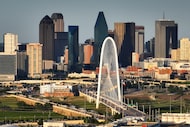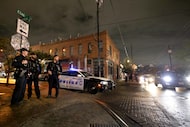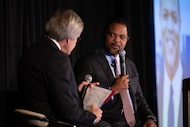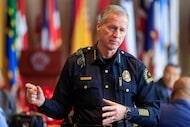A nonprofit that backed a Dallas charter amendment meant to boost police hiring, benefits and starting pay has vowed to “hold city leaders accountable” after the City Council approved a budget that raises starting police pay by nearly 8%, but leaves Dallas ranked 12th in the region.
The $5.2 billion budget, which takes effect Oct. 1, includes funding to hire 350 new officers by fall 2026 and boosts starting salaries to $81,232. But Dallas Hero and other critics argue the increase falls short of Proposition U’s mandate that Dallas police rank in the top five among North Texas departments for starting pay. The November 2024 charter amendment, which passed with just 50.5% of the vote, also requires the city to maintain at least 4,000 officers. Dallas currently has about 3,200.
“Dallas remains 12th in starting pay — a clear violation of the charter and the will of the voters,” Damien LeVeck, Dallas Hero’s executive director, said in a Sept. 18 statement.
At the heart of the dispute is how to measure compliance.
The charter amendment says Dallas police starting salaries — including base pay and non-pension benefits — must rank in the top five among departments in Dallas, Collin, Tarrant, Denton and Rockwall counties with populations over 50,000. Sign-on bonuses don’t count, and the city must hire an independent firm annually to study regional pay.
Political Points
Related

City Manager Kimberly Bizor Tolbert and Chief Financial Officer Jack Ireland insist the budget not only meets the legal requirements of Proposition U — including pension funding and police pay — but goes beyond them. Their interpretation, they say, is backed by a thorough review from the city attorney’s office.
“What it appears to me is that maybe somebody wrote some stuff that they don’t know is in their own proposition,” Tolbert told The Dallas Morning News in August. “But that’s not our fault, and it wasn’t our job to go back and tell them what was wrong with their language.”
City officials admit that Dallas ranks 12th in base pay alone, trailing smaller cities like Grand Prairie, Frisco and Plano. But they argue that when factoring in stipends — such as bilingual pay, education incentives and assignment bonuses — their March study placed Dallas third overall, meeting the top-five threshold.
The catch? Not every officer qualifies for those extra benefits, meaning many won’t actually reach that higher pay level. It’s led to people like City Council member Cara Mendelsohn calling for an updated pay study and urging a steeper boost in starting pay to more definitively close the gap.
Related

Mendelsohn last Wednesday proposed $4.5 million in budget cuts to redirect funds toward higher police and fire pay — but the measure failed to gain traction.
“If we don’t improve our salary, we are going to lose our officers,” Mendelsohn warned. “And if we lose our officers, our city is at risk.”
What Proposition U requires
Proposition U requires that when Dallas collects more revenue than it did the previous year, at least half of that extra amount must first go to the Dallas Police and Fire Pension System. The amount given to the pension system must meet or exceed what the State Pension Review Board or City Council requires, whichever is higher.
“Revenue,” in the city charter, refers to all money the city collects that isn’t restricted by state or federal law. The charter says this includes property, sales and hotel taxes; parking, franchise and court fees; and fines, donations and income from city services and investments. It does not include money borrowed by the city or grants and funding from other governments or nonprofits, unless that money originally came from Dallas.
But the city and Dallas Hero officials differ on whether funds like the hotel occupancy tax, which the city treats as restricted, should count as unrestricted under Proposition U’s language.
Ireland told The News the city calculated its unrestricted revenue increased by $61.6 million, meaning $30.8 million must go to pensions. But the City Council already approved a $225.7 million pension contribution for the upcoming fiscal year, far exceeding the Proposition U requirement, he said.
“I think I can shut the book because that’s all there is,” Ireland told The News. “We have got $30.8 million that is subject to the proposition, and we’re spending $225.7 million on the Dallas Police and Fire Pension System. What else am I supposed to do?”
Related

Ireland said the city’s total budget increased by over $200 million, but most of that growth comes from restricted funds that cannot be used for Proposition U’s requirements.
He cited as examples Dallas Water Utilities and aviation funds being restricted by state law and only allowed to be used for specific purposes. He said property tax revenue is divided between the general fund for city operations and the debt service fund for repaying bonds and debt. Money in the debt service fund can’t be used for salaries or pensions, he said. Even within the general fund, Ireland said some revenue, like fees for food inspections or vendor licenses, is restricted to specific services.
Under Dallas city code, hotel tax revenue is legally earmarked for tourism, convention centers and arts, which are uses authorized by state law.
But Dallas Hero argues the city is using a narrow interpretation of what counts as “revenue.” Proposition U’s definition includes all city revenue unless it is explicitly restricted by state or federal law.
Dallas Hero estimates that if the city included all eligible revenue, the 50% requirement would be closer to $111 million, not $30.8 million. Funds like the hotel occupancy tax and sanitation services should count as unrestricted revenue under Proposition U, according to LeVeck. State law, for instance, doesn’t require Dallas to restrict hotel occupancy tax funds.
“If the City Council is excluding certain enterprise funds like hotel occupancy tax, sanitation services, and planning and development, it owes taxpayers a clear explanation,” LeVeck said.
Related

He added that on the pension front, he believes the city is conflating two separate obligations. The $225.7 million should be separate from Prop U’s 50% rule and calculated independently, according to LeVeck, because the larger tally is part of the state’s mandate requiring long-term pension solvency. He believes Prop U’s 50% rule should be added on top of the city’s pension payment requirements.
“Counting the state-mandated contribution as if it satisfied Prop U is misleading and undermines the amendment’s purpose,” LeVeck said.
‘It’s always a moving number’
The city’s decision to conduct its police pay study in March — rather than later in the year — has become a flashpoint in the debate over Proposition U compliance.
“Proposition U doesn’t say when to do the analysis. Our meet and confer agreement says do it in March. So we did it in March,” Ireland said. “It’s always a moving number. Maybe somebody increased pay in April, maybe somebody increased pay in May.”
The city’s current meet and confer agreement, which is a labor agreement between the city and its police and fire associations, expires at the end of September. Negotiations are underway for a new one. Pay and benefits are among the topics negotiated in the agreement.
But critics argue the March timeline distorts reality.
“This practice creates the false impression that Dallas is competitive when in reality, surrounding cities offer much stronger base salaries and are attracting our officers away,” LeVeck said.
Tolbert noted the meet and confer agreement initially called for raising starting pay to $78,924, but the city is increasing it further — to $81,232 — and maintaining pay parity with firefighters. She also argued that chasing the top pay ranking is unrealistic, given that smaller cities can adjust salaries more easily for their much smaller forces.
At an Aug. 20 City Council meeting, Jaime Castro, president of the Dallas Police Association, said 40% of Dallas officers leave within five years, costing the city $275,000 per officer in training expenses. He argued that officers are leaving for cities that “understand and respect their value and compensate them accordingly.”
Castro used an analogy to drive home his point: If a bottle of water costs $1 at a general store, $5 at a movie theater and $10 on a plane, the price reflects how much the seller values it. Dallas officers, he said, are like that bottle of water and, right now, Dallas is the general store.
“I implore the city of Dallas, the City Council and the city manager: Don’t be the general store,” Castro said.
Tolbert emphasized that getting to a police force of 4,000 is a multiyear process, not something that can happen overnight, adding that the city also needs new training facilities and infrastructure to support a larger force.
The city plans to hire 350 new officers over 12 months starting Oct. 1 and 400 new officers each following year until 2029, when city leaders estimate hitting 4,000 officers. The department had 3,212 officers as of Tuesday.
Related

Tolbert noted that no other city in the region hires at this scale, making direct comparisons to cities a fraction of the size of Dallas unfair.
“You’re asking us to compare ourselves to cities that might hire two? Three? Five? 10? But nobody’s hiring 350 officers,” Tolbert said. “So yeah, they can always be in first place, because the budgetary impact that they have on maybe a force of 20 or 30 is nothing like a city of our size.”
‘Above and beyond’
Around a dozen residents, including LeVeck, told the City Council during a Sept. 3 meeting that they were frustrated the city isn’t doing more to increase starting pay and hire more police officers.
“You can say ‘above and beyond’ all you want. You can cherrypick stipends, but residents can see with their own eyes that this budget does not comply with Proposition U,” said Diane Benjamin.
Tolbert said ultimately it will be on the city to clearly communicate how it is responding to the concerns and the mandates of Proposition U. She believes public perception will ultimately depend on visible results, like faster response times and people seeing more officers on the street.
“We have a responsibility to make sure that the public does see that we’re doing the things that matter to them the most,” Tolbert said, “and when it looks like we’re not, we can’t build trust like that.”
